Introduction to Streetwear and Loungewear Manufacturing
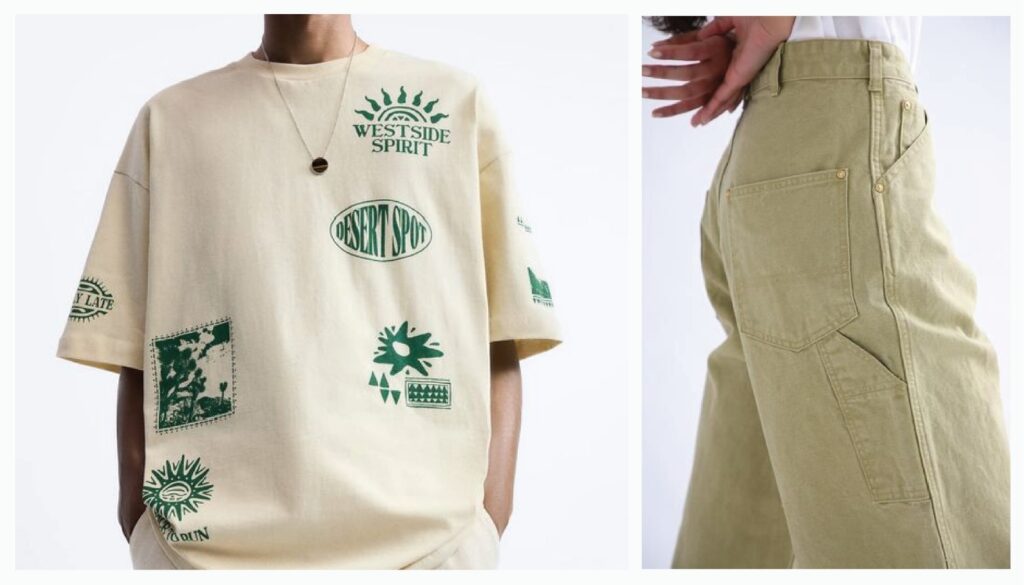
The blend of streetwear and loungewear with the fashion industry marks a revolutionary combination of style, culture, and comfort. Streetwear, originating from the skate and surf cultures of California, has transcended its roots to embody a broader urban fashion movement. A movement, marked by bold graphics, distinctive logos, and relaxed silhouettes.
On the other hand, loungewear has risen from a simple home attire to a fashion statement. That was particularly the case in the wake of global shifts towards remote work and prioritizing comfort. This evolution has not only redefined casual wear but has also blurred the lines between public and private dressing. It incorporates soft fabrics, elastic waistbands, and versatile designs that cater to both comfort and aesthetic appeal.
The manufacturing landscape for these segments is as dynamic as the fashion itself. It requires a keen understanding of market trends, consumer behavior, and sustainable practices. A realm where creativity meets craftsmanship, pushing the boundaries of traditional fashion manufacturing to accommodate the fast-paced and ever-changing demands of the streetwear and loungewear markets.
Streetwear and Loungewear Manufacturing Services by Deepwear
Deepwear fashion agency has carved a niche in the streetwear manufacturing domain. It offers end-to-end solutions that span from conceptual design to final product delivery. The company approach is deeply rooted in understanding the essence of streetwear – a mix of culture, fashion, and rebellion against the norms.
Deepwear has an extensive network of factories, partnering with some of the most skilled streetwear and loungewear clothing manufacturers. The agency ensures that each piece aligns with current trends and pushes the envelope in terms of design and quality. Each apparel manufacturer is selected based on stringent criteria. Thus ensuring they adhere to ethical practices and deliver products that meet the highest standards of quality and sustainability.
Since its inception in 2007 Deepwear has developed a vast number of collections for streetwear brands looking to make their mark within the industry. The agency offers unparalleled access to a wealth of resources. This includes cutting-edge trends, market insights, and a vast array of materials and finishes. Deepwear empowers brands to create unique, trendsetting pieces that resonate with their target audience. Thus, establishing a strong brand identity in the competitive streetwear market.
Navigating the Streetwear and Loungewear Market with Deepwear
Navigating the streetwear market requires more than just understanding current trends. It demands a forward-thinking approach that anticipates future movements and consumer preferences. Deepwear positions itself as not just a service provider but a strategic partner that offers brands a competitive edge in this dynamic market.
The company maintains full presence in three of the most prominent locations when it comes to streetwear production. These are Portugal, Turkey, and China. The expertise in streetwear clothing designs and manufacturing within these locations enables brands to take advantage of the experience and factory network of Deepwear with the company’s protections.
To go even further, Deepwear’s holistic approach extends beyond design and manufacturing. In fact, it encompasses market entry strategies, brand positioning, and consumer engagement tactics. This comprehensive support system is tailored to each brand’s unique vision and goals, ensuring they can navigate the complexities of the streetwear market with full confidence.
And last but not least, Deepwear emphasizes customization and innovation. The fashion agency encourages brands to explore new materials, techniques, and sustainable practices. This not only enhances the brand’s appeal but also aligns with the growing consumer demand for ethical and environmentally friendly products.
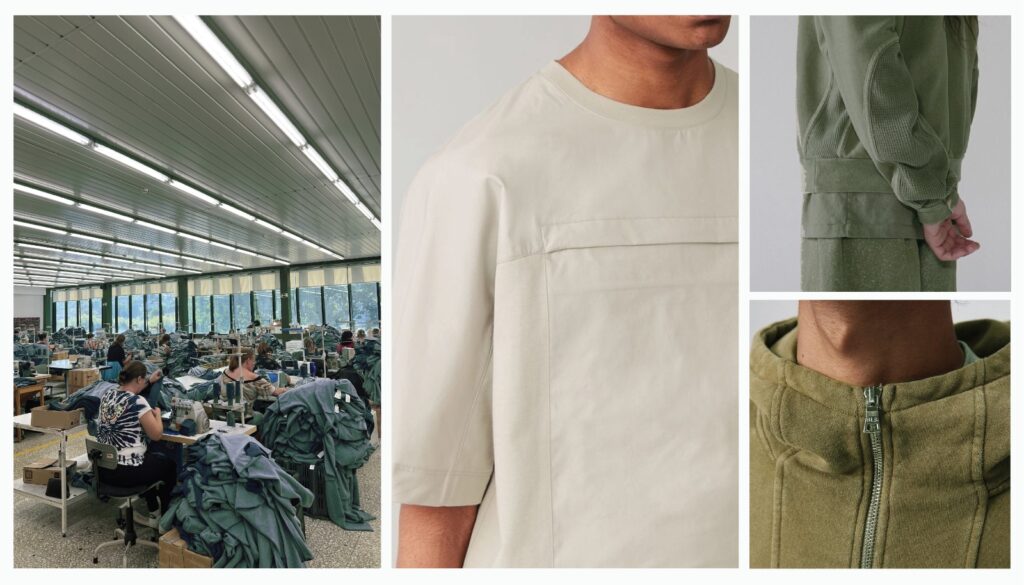
Why Portugal, Turkey, and China?
Portugal, Turkey, and China have each carved out significant niches in the global textile and fashion industry. Particularly in the realms of streetwear and loungewear production. Here’s why these countries are considered among the best for these sectors:
Portugal
High-Quality Manufacturing: Portugal is renowned for its high-quality textile production, especially in the northern regions. The country has a long history of craftsmanship in textiles, which translates into exceptional quality in streetwear and loungewear.
Sustainability Focus: Many Portuguese manufacturers prioritize sustainable and eco-friendly practices, appealing to brands and consumers looking for green alternatives. This is increasingly important in the fashion industry.
Flexibility and Innovation: Portugal’s textile industry is characterized by its flexibility and ability to innovate, making it a great partner for streetwear brands that often experiment with new designs and materials.
Proximity to European Markets: Being in Europe, Portugal offers logistical advantages to brands within the EU, including shorter lead times and lower shipping costs compared to Asian production hubs.
Turkey
Vertically Integrated Supply Chain: Turkey’s textile industry benefits from a vertically integrated supply chain, meaning that everything from the raw materials to the final garment can be sourced and produced within the country. This efficiency reduces costs and lead times.
Competitive Pricing: While maintaining a high standard of quality, Turkish manufacturers can often offer competitive pricing due to the country’s lower labor costs compared to Western Europe.
Flexibility and Speed to Market: Turkish manufacturers are known for their flexibility and ability to produce both small and large orders quickly, which is crucial for streetwear brands that rely on fast fashion cycles.
Rich Textile Heritage: Turkey has a rich heritage in textiles and garment production, offering a wide range of fabrics and techniques that are perfect for innovative streetwear and loungewear.
China
Massive Manufacturing Capacity: China is the world’s largest producer of textiles and clothing. Its massive manufacturing capacity means it can handle high volumes, making it ideal for both established and growing streetwear brands.
Advanced Technology and Infrastructure: Chinese manufacturers have access to the latest manufacturing technology and robust infrastructure. This supports efficient production, from basic items to high-end streetwear incorporating complex designs and materials.
Comprehensive Supply Chain: China offers a complete supply chain solution. These range from raw material sourcing to final production, including a vast array of fabrics and embellishments.
Scale and Cost-Effectiveness: The sheer scale of China’s textile industry, combined with its efficiency, allows for competitive pricing without necessarily compromising on quality. This is particularly advantageous for brands looking to scale their operations.
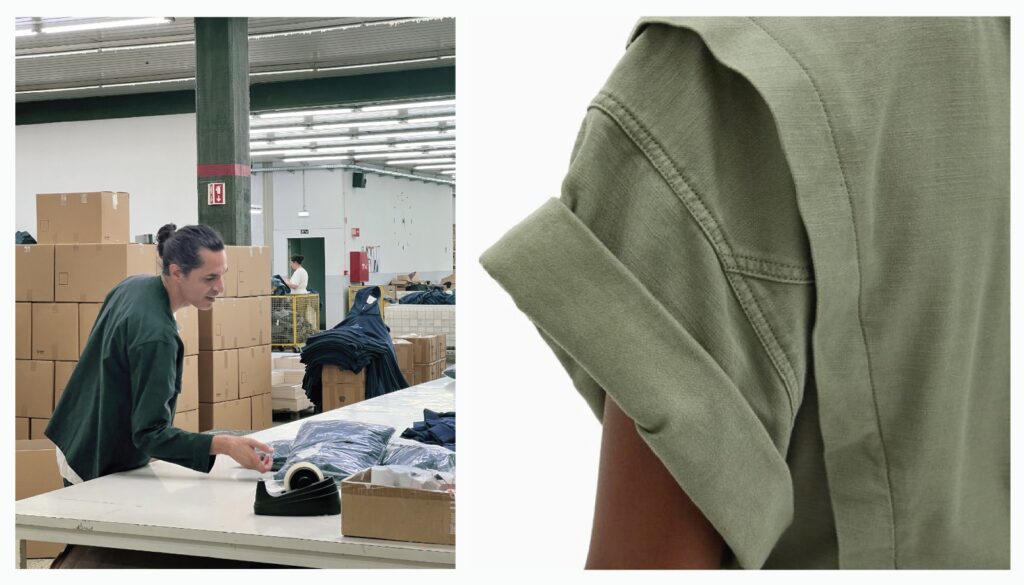
Advantages and disadvantages of Portugal, Turkey, and China
The production of streetwear garments in Portugal, Turkey, and China each comes with its own set of advantages and disadvantages. These can be influenced by factors such as cost, quality, speed, and sustainability. Below is a breakdown for each country:
Portugal
Advantages:
- High Quality: Portugal is known for high-quality manufacturing standards, especially for textiles, which is crucial for brands that prioritize product quality.
- Sustainability: There’s a strong emphasis on sustainability and ethical manufacturing, appealing to brands and consumers looking for eco-friendly options.
- Innovation: Portuguese manufacturers are often very open to innovation, adopting new technologies and materials that can be beneficial for streetwear brands looking to differentiate their products.
- Proximity to European Markets: Being in Europe, Portugal offers logistical advantages for brands based in the EU, including lower shipping costs and faster shipping times.
Disadvantages:
- Higher Costs: Due to its focus on quality and sustainability, manufacturing costs in Portugal can be higher than in Asian countries, which might be a barrier for smaller brands or those with very tight margins.
- Limited Scale: While capable, the scale of production might be smaller than what larger brands require or what countries like China can offer. You may also experience that some factories that are popular to be quite busy and booked up.
Turkey
Advantages:
- Vertically Integrated Supply Chains: This allows for efficient production processes, from raw material sourcing to finished product, potentially lowering costs and improving speed to market.
- Competitive Pricing: Costs can be lower than in Western Europe while still offering high-quality manufacturing.
- Speed and Flexibility: Turkish manufacturers are known for their ability to quickly produce and adapt to changing trends, which is key for the fast-paced streetwear market.
Disadvantages:
- Political and Economic Instability: In recent years, Turkey has faced periods of political and economic instability, which can pose risks to supply chain reliability and predictability.
- Geopolitical Tensions: Depending on the brand’s home country, geopolitical tensions could affect long-term strategic planning and partnership stability.
China
Advantages:
- Massive Manufacturing Capacity: China’s vast manufacturing capabilities mean it can handle large volumes efficiently, which is beneficial for brands looking to scale.
- Cost-Effectiveness: Large scale and efficiency often lead to more competitive pricing, making it attractive for brands with tight budgets.
- Advanced Manufacturing Technology: Chinese manufacturers often have access to cutting-edge technology, allowing for innovative production techniques and high-quality outputs.
Disadvantages:
- Intellectual Property (IP) Risks: China’s vast manufacturing sector sometimes poses challenges related to intellectual property protection. Navigating IP laws and ensuring that your designs are protected requires careful planning and, often, additional support.
- Communication and Cultural Differences: Collaborating with manufacturers in China may present challenges stemming from language barriers and differences in business culture. Establishing clear communication channels and understanding cultural nuances are essential to mitigate these risks and ensure smooth production processes.
- Complex Supply Chains: Navigating the vast and complex manufacturing landscape in China can be challenging, especially for smaller brands or those new to the market.
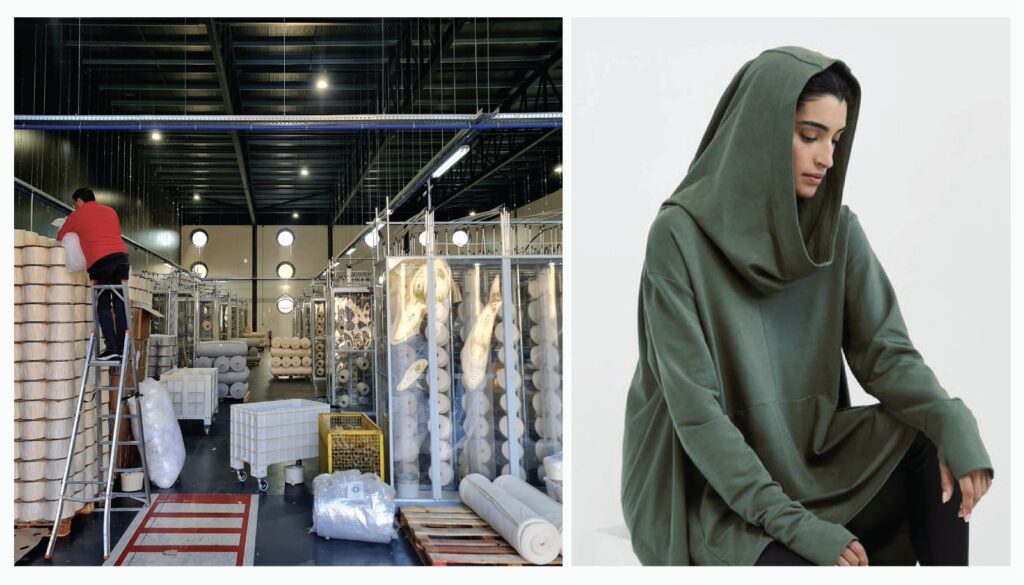
How Can Fashion Brands Best Succeed in Streetwear?
Here are some useful insights that can be of great help for fashion brands looking to succeed with the streetwear sector:
- More than 60% of streetwear consumers are under the age of 25
- About 70% of streetwear consumers earn an annual income of $40,000 or less
- Asian consumers spend more on streetwear
- 56% of streetwear consumers spend an average of $100 – $300 on a single item from their favorite brand
- 53% are most likely to buy streetwear products in the brand’s own store, and 42% from its website
- Social media is streetwear consumers’ top source with 84% of influence
- Musicians have the biggest credibility among consumers with 65%, compared to social-media influencers with 32%.
- 70% of streetwear’s young fans think of themselves as being socially and environmentally conscious
Loungewear Manufacturing Expertise at Deepwear
Deepwear’s proficiency in loungewear manufacturing is unparalleled, reflecting a keen understanding of current consumer demands for comfort paired with sustainability. This segment, once considered informal home attire, has been elevated to mainstream fashion, thanks in part to shifts in social norms and work habits.
Deepwear capitalizes on this trend by blending high-quality, eco-friendly materials with innovative designs that appeal to a broad audience seeking both style and comfort. Their manufacturing process is meticulously planned, from the selection of soft, sustainable fabrics to the final touches that embody luxury and ease.
The company approach goes beyond mere manufacturing. It offers brands strategic insights into consumer behavior and helps them to craft loungewear that resonates with today’s environmentally conscious customers. In doing so, Deepwear fosters a culture of innovation. The company pushes the boundaries of what loungewear can be and setting new benchmarks for quality and sustainability in the fashion industry.
Unlocking Opportunities in the Streetwear and Loungewear Industry
The streetwear and loungewear segments present vast opportunities for growth and innovation, driven by evolving consumer preferences towards more casual, comfortable, and sustainable fashion choices. Deepwear stands at the vanguard of this shift, offering brands a comprehensive toolkit to explore and capitalize on these markets.
The fashion agency’s commitment to sustainability and ethical manufacturing aligns with the increasing demand for responsible fashion, providing a competitive edge to brands in their network. Deepwear’s collaborative approach encourages brands to experiment with new materials, designs, and production methods, fostering a culture of innovation that drives the industry forward.
By leveraging Deepwear’s expertise, streetwear brands can navigate the complexities of the market, delivering products that meet the high expectations of modern consumers.
But what are the most demanded streetwear products nowadays? The top 3 are hoodies, T-shirts, and shoes with no limit to their wearability. Here 15 of the most looked for streetwear products now:
- Hoodies and sweatshirts
- T-Shirts
- Logo tees
- Sneakers
- Hats
- Sweatpants
- Cargo pants
- Ribbed socks
- Baggy jeans
- Denim jackets
- Puffer jackets
- Slide sandals
- Windbreakers
- Sports jerseys
- Blazers
What Are the Best Fabrics in the Streetwear and Loungewear Segment?
In the streetwear and loungewear segment, fabric choices are crucial for both the aesthetic and functional qualities of the garments. The trends in these fabrics evolve with consumer preferences, technological advancements, and sustainability concerns. Here’s an overview of the types of fabrics that are currently trendy, considered good quality, and are common in streetwear and loungewear:
Cotton
- Organic Cotton: Highly sought after for its sustainability and softness, organic cotton is grown without harmful chemicals, making it better for the environment and the wearer’s skin.
- Supima Cotton: Known for its superior strength and softness, Supima cotton is a premium type of cotton grown in the USA, ideal for high-quality streetwear.
Technical fabrics
- Polyester Blends: Polyester, often blended with cotton or other materials, offers durability, moisture-wicking properties, and ease of care, making it suitable for active streetwear.
- Nylon: Valued for its strength and water-resistant properties, nylon is often used in performance-oriented streetwear and outerwear.
- Neoprene: Offering a unique texture and thermal insulation, neoprene adds a futuristic edge to streetwear designs.
Sustainable fabrics
- Recycled Polyester: Made from recycled plastics, this fabric aligns with the growing trend towards sustainability in fashion.
- Tencel/Lyocell: Derived from wood pulp, Tencel is eco-friendly, soft, and has excellent moisture-wicking properties, making it ideal for comfortable loungewear.
- Bamboo: Bamboo fabric is soft, antibacterial, and biodegradable, offering a sustainable choice with a minimal environmental footprint.
Denim
- Selvedge Denim: Appreciated by enthusiasts for its quality and durability, selvedge denim is often featured in high-end streetwear.
- Distressed Denim: Continues to be popular in streetwear for its rugged, lived-in look.
Innovative and specialty fabrics
- Reflective Materials: Fabrics that reflect light, enhancing visibility and adding a high-tech feel to garments.
- Thermal and Phase Change Materials: These fabrics can regulate body temperature, providing comfort in various environmental conditions.
- Water-Resistant and Waterproof Fabrics: For outerwear, these materials are essential for functionality and comfort.
Knits
- Jersey: Soft, stretchy, and comfortable, jersey knit is a staple for t-shirts and casual tops.
- French Terry: Known for its moisture-wicking properties and comfort, French terry is a popular choice for hoodies and joggers.
What Sort of Quantities a Brand Should Start with in the Streetwear Fashion Sector?
When starting a streetwear brand, determining the initial production quantities is crucial and can significantly impact your budget, inventory management, and overall brand strategy. The ideal starting quantities can vary based on several factors, including your target market, the exclusivity of your brand, your budget, and manufacturing constraints. Here are some general guidelines and considerations for setting initial production quantities for a streetwear brand:
Start Small
- Limited Editions: Many successful streetwear brands begin with limited runs to create a sense of exclusivity and urgency. Starting with small quantities (e.g., 100-500 units per design) can help test the market without overcommitting resources.
- Minimize Inventory Risk: Smaller quantities reduce the risk of unsold inventory. This approach allows you to gauge customer interest and preferences before scaling up production.
Understand Your Audience
- Target Market Size: Estimate the size of your target market and their willingness to purchase your products. A niche market may require smaller quantities, whereas a broader market could justify larger runs.
- Engagement and Demand: Use social media and other marketing tools to gauge potential customer interest and demand. High engagement rates can be a good indicator of the quantities you might successfully sell.
Budget Considerations
- Investment Capacity: Your budget will directly influence how many items you can produce. Consider not only the cost of production but also marketing, shipping, and storage expenses.
- Pricing Strategy: Your pricing strategy should reflect your production costs and desired profit margins. Smaller quantities often mean higher production costs per unit, which needs to be considered in your pricing.
Manufacturer Minimums
- Minimum Order Quantities (MOQs): Many manufacturers have MOQs, which can affect your starting quantities. Negotiate MOQs with manufacturers or find those willing to produce smaller batches to align with your initial production needs.
Scalability
- Plan for Scalability: Starting small doesn’t mean thinking small. Have a plan for scaling up production based on predefined sales milestones or customer feedback.
- Pre-orders: Consider using pre-orders to gauge interest and secure funding for production without overproducing. This approach can also help in planning production quantities for future runs.
Testing and Feedback
- Product Variety: Instead of producing large quantities of a single design, consider offering a wider range of designs in smaller quantities. This variety can help identify which products are most popular and inform future production decisions.
- Collect Feedback: Use the initial production run as an opportunity to collect customer feedback on the quality, design, and fit of your products, which can be invaluable for improving and scaling your offerings.
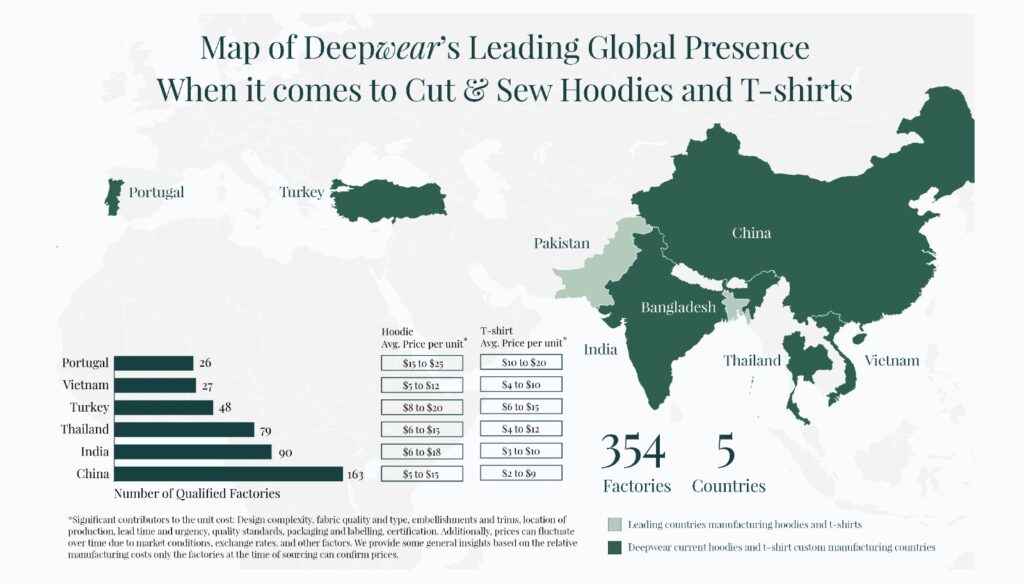
What Sort of Average Pricing can Brands Base Themselves on?
Pricing in the streetwear market can vary widely, influenced by factors such as brand positioning, quality of materials, production costs, exclusivity, and target market. Understanding these factors can help in determining an appropriate pricing strategy for your streetwear brand. Here’s a general overview of how pricing might be approached, keeping in mind that actual figures can fluctuate based on specific circumstances such as location, economic conditions, and market trends.
Entry-Level Streetwear
- Pricing Range: Entry-level streetwear brands, which typically cater to a broader audience looking for accessible fashion, might price t-shirts in the range of $20 to $50, hoodies around $50 to $100, and pants or special items could range from $50 to $100.
- Factors Influencing Price: For these brands, pricing is often a balance between quality and affordability. The costs are kept reasonable by optimizing production processes, choosing cost-effective materials, and producing in larger quantities to benefit from economies of scale.
Mid-Tier Streetwear
- Pricing Range: Mid-tier brands, which offer a balance of quality, uniqueness, and brand recognition, might price t-shirts from $50 to $100, hoodies between $100 to $200, and special items or outerwear can range from $100 to $300.
- Factors Influencing Price: These brands often utilize better quality materials and more detailed designs compared to entry-level. They might also produce in smaller quantities than mass-market brands, which can increase the per-item cost but also adds a sense of exclusivity.
High-End or Luxury Streetwear
- Pricing Range: High-end streetwear and luxury collaborations can see t-shirts priced from $100 to $300+, hoodies starting at $200 to $500+, and special items or high-quality outerwear can easily exceed $500.
- Factors Influencing Price: Luxury streetwear pricing reflects not only the quality of materials and craftsmanship but also the brand’s market positioning and the exclusivity of the product. These brands often have limited production runs, collaborate with well-known designers or artists, and sell through select retail channels.
Considerations for Setting Prices
- Production Costs: Calculate your total costs, including materials, labor, shipping, duties, and any other expenses related to getting your product to market. Understanding your cost structure is crucial for setting a profitable price.
- Market Positioning: Consider how you want your brand to be perceived in the market. Your pricing strategy should align with your brand identity, whether it’s accessible, mid-tier, or luxury.
- Competitor Pricing: Research your competitors’ pricing strategies. Understanding the price range for similar products in the market can help you position your brand competitively.
- Perceived Value: The value your target audience places on your products can influence how much they’re willing to pay. Brand storytelling, product quality, and unique designs can increase perceived value.
- Profit Margins: Determine your desired profit margin for each product. A common approach is to use a keystone pricing strategy, where the retail price is set at double the wholesale price, but this can vary based on your specific goals and market dynamics.
Conclusion: Partner with Deepwear for Your Streetwear and Loungewear Manufacturing Needs
Deepwear has a comprehensive experience in the fashion industry. Within the streetwear segment, the company serves as a valuable asset for brands looking to navigate the complexities of production and supplier management. Deepwear’s expertise is not just in the creation of apparel but extends significantly into strategic advisory services. The agency ensures brands make the most efficient use of their available budgets. Here’s how Deepwear stands out as an invaluable partner for streetwear brands:
Budget optimization
Deepwear’s deep industry knowledge enables them to offer tailored advice on budget allocation and optimization. They can guide brands on how to prioritize spending in areas that will yield the highest return, ensuring that every dollar spent contributes directly to the brand’s success. Whether it’s material selection, production techniques, or marketing investments, Deepwear provides insights that help brands maximize their resources.
Supplier Negotiation and Production Management
Navigating the complexities of supplier negotiations and production management can be daunting, especially for emerging brands. Deepwear steps in as a crucial intermediary, leveraging their established relationships and negotiation expertise to secure favorable terms. They can assist brands in working with existing suppliers, smoothing out any potential challenges and fostering a collaborative environment that benefits all parties involved.
Risk Mitigation and Success Enhancement
By partnering with Deepwear, brands gain a layer of protection against common pitfalls in the fashion production process. Deepwear’s experience in the streetwear segment allows them to foresee potential issues and address them proactively, thereby safeguarding the brand’s interests. This foresight and preparation significantly increase a brand’s chances of success in a competitive market.
Proven Track Record
Deepwear’s history of assisting numerous brands in the streetwear segment speaks volumes about their expertise and the value they bring. This accumulated experience has honed their ability to offer actionable, effective advice and support tailored to the unique needs and aspirations of each brand. Their proven track record is a testament to their ability to elevate brands and guide them towards achieving their strategic goals.
Cost-Effectiveness
While some might perceive hiring an external agency like Deepwear as an additional expense, it’s more accurate to view it as an investment in the brand’s future success. The efficiencies, savings, and improved outcomes they facilitate often far exceed the cost of their services. This makes the fashion agency a valuable asset rather than a cost. The strategic advantage and industry insights Deepwear provides can help brands avoid costly mistakes, negotiate better terms, and ultimately achieve a stronger market position.
Let’s Spread the Positive Vibes!
If you found this article helpful please share it with your friends, family and colleagues. In the meantime you can learn more about us and what we do on Deepwear flagship website or on our official Facebook page. Alternatively, you are more than welcome to request a meeting with a member of our team using the form below.